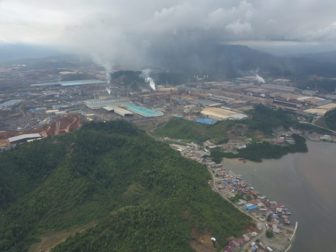Less than a year ago, two major nickel EV battery chemical processing plants planned to dump 31 million tonnes of toxic mine waste into the Coral Triangle, threatening fragile and endangered coral reefs and subsistence fishing communities.
Today, both projects have withdrawn their permits to dump mine waste into the ocean, and the Indonesian government has publicly committed not to issue permits for the harmful practice.
But there is still work to do.
Earthworks is collaborating with Action for Ecology and People’s Emancipation (AEER) to ensure the Indonesian government uphold its promise to prohibit all future submarine tailings disposal. Until then, the risks to downstream users, financial backers, and most of all communities and the marine environment, remain.
The transition to electric vehicles shouldn’t be built on the backs of Indonesians. Read the statement from AEER below and take action to demand the Indonesian Ministry of Environment and Forestry uphold best global standards and ban ocean dumping and coal power.
Indonesia promised to protect the ocean from mine waste, but risky regulation threatens to undermine its commitment

Indonesia is the world’s largest nickel producer and is poised to dramatically scale up production to meet skyrocketing demand. Nickel demand is expected to increase six-fold by 2030, driven in large part by demand for electric vehicle batteries.
The two major projects anchoring the country’s battery-grade nickel build out, the Morowali Industrial Park and the Obi Island project, had submitted permit requests to dispose of 31 million tonnes of mine waste into the highly biodiverse Coral Triangle using the controversial and outdated practice of submarine tailings disposal. Ocean dumping is a cheap and convenient way to dispose of mine waste, but due to its environmental and health impacts has been phased out or prohibited in most parts of the world.
Facing pushback from local communities and concerns from EV companies that the impacts of dirty mining will undermine the shift to clean energy, developers withdrew the permit requests to dump mine tailings into the ocean in October 2020. And on February 5, 2021, following the submission of an investment proposal by Tesla, a spokesperson for the Indonesian government announced that it would no longer permit new mining projects to dump mine waste into the ocean.
However, just three days later the Indonesian government undermined its own commitment, passing a regulation that allows submarine tailings disposal. Government Regulation N0 22 Year 2021 on Implementation on Protection and Management of Environment continues to allow submarine tailing disposal, with minimum depth 100 meter in area if thermocline does not exist.
This regulation leaves the door open to ocean dumping and stands in contradiction to the government’s public commitment, and despite the growing momentum against the practice. The government’s contradiction should be cause for concern for EV manufacturers, financial backers and mine waste-impacted coastal communities.
The current unclear and uncertain regulatory environment puts the onus on downstream users and financial backers to ensure ocean dumping doesn’t go forward, highlighting the reputational risk associated with the practice. Automakers Ford, BMW and Daimler-Benz have joined the Initiative for Responsible Mining Assurance, signaling their commitment to responsible mineral sourcing and a rejection of dangerous practices, including ocean dumping.
Citigroup, Standard Chartered and Credit Suisse have already prohibited or severely restricted financing for companies that use ocean dumping, and Storebrand, a major Norwegian asset manager, divested from the Ramu nickel and cobalt mine in Papua New Guinea over environmental harm from ocean tailings dumping.
The Indonesian government must put into place regulation that fully restricts all submarine tailings disposal. Governments and companies involved in the global nickel supply chain should not support submarine tailings disposal. Doing so would make EV batteries part of the global ecology problem and contribute to new sources of coastal and marine pollution.
Economic recovery following the COVID-19 pandemic must prioritize environmental sustainability. Unfortunately, the Indonesian regulation to provide employment and increase investment weakens environmental governance reducing future economic development, particularly for coastal communities.
Support the campaign to protect the sea from nickel battery tailings waste by signing the petition pushing nickel battery industries to apply the best standard on environment.
